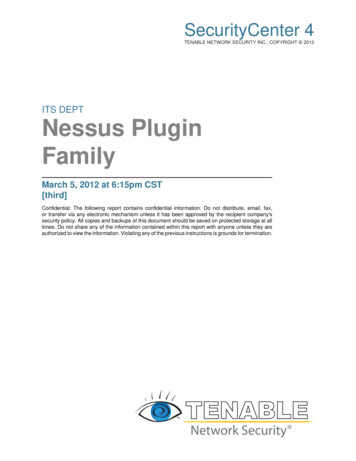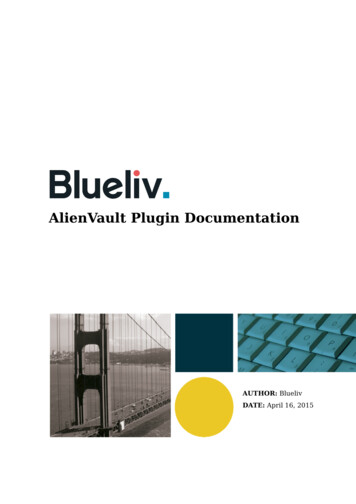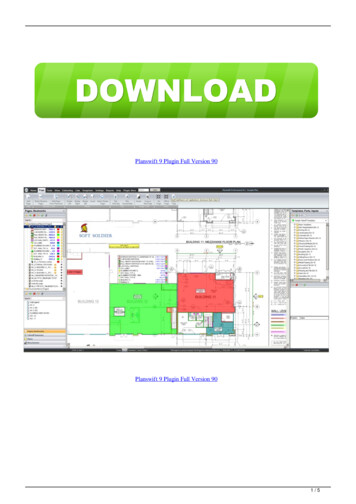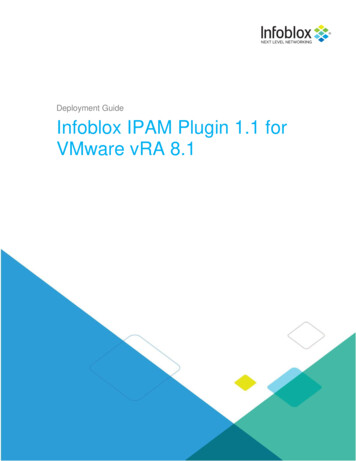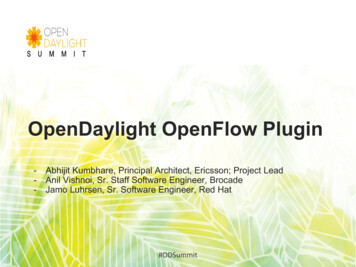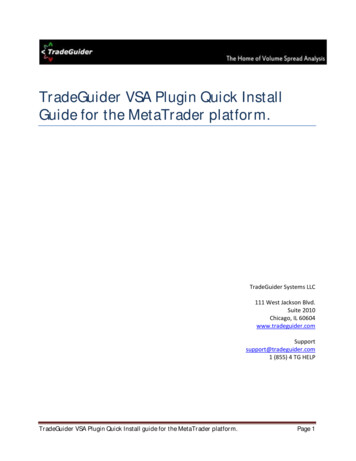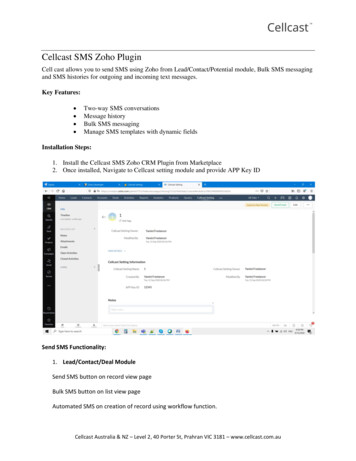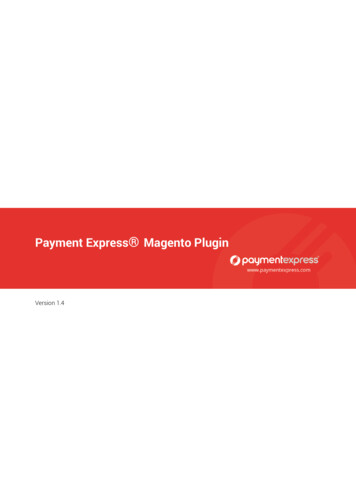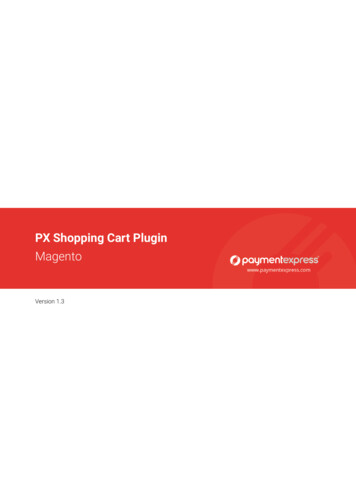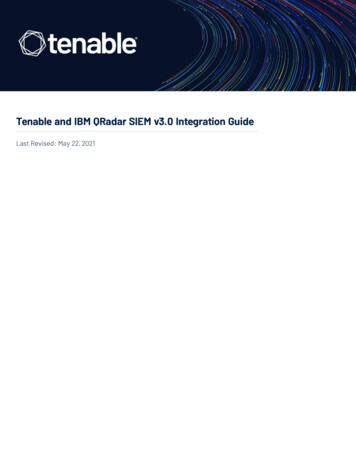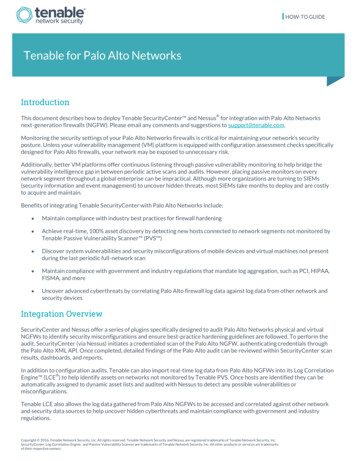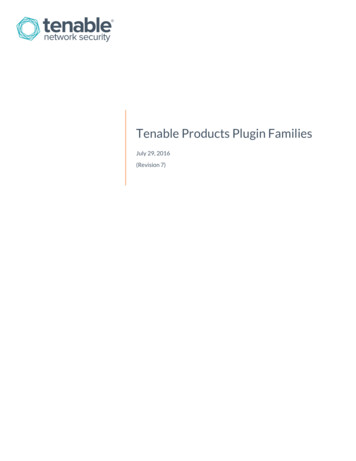
Transcription
Tenable Products Plugin FamiliesJuly 29, 2016(Revision 7)
Table of ContentsIntroduction . 3Nessus . 3Nessus Plugin Families . 3Passive Vulnerability Scanner . 7PVS Plugin Families. 7Log Correlation Engine . 9LCE Event Types and Plugin Families . 9For More Information .13About Tenable Network Security .13Copyright 2016. Tenable Network Security, Inc. All rights reserved. Tenable Network Security and Nessus are registered trademarks of Tenable Network Security, Inc. SecurityCenter ContinuousView, Passive Vulnerability Scanner, and Log Correlation Engine are trademarks of Tenable Network Security, Inc. All other products or services are trademarks of their respective owners.2
IntroductionThis document describes Tenable Network Security’s product plugin families for Nessus, Log Correlation Engine (LCE), andthe Passive Vulnerability Scanner (PVS). Please email any comments and questions to support@tenable.com.A basic understanding of the product in use is assumed.Vulnerabilities in hosts on your network provide the possibility of data compromise. Tenable Nessus, PVS, and LCE gathercomplementary security data that can be correlated with Tenable SecurityCenter Continuous View for a comprehensiveview of all types of vulnerability data. Tenable provides plugins for these products, which are scripts that complete a series ofindividual tests on target systems.NessusNessus is the market leading vulnerability management solution. Nessus is available via multiple packaging options(Professional, Manager, and Cloud). Capabilities in all versions of Nessus include: Vulnerability assessment and basic reporting Broad coverage of networks, devices, systems, virtual, and cloud services The most comprehensive vulnerability library on the market Malware detectionWith Nessus Cloud and Manager, you also get: The ability to share scan resources Mobile, patch and credential management system integration An agent-based scanning option to increase scan flexibilityNessus Plugin FamiliesNessus plugin families are designed to allow an efficient and accurate grouping of similar security checks. This allows a userto quickly enable or disable a large group of plugins that are relevant to the target being scanned or unnecessary for a givenhost.The following table summarizes the Nessus plugin families:Plugin FamilyDescriptionAIX Local Security ChecksSecurity checks that test IBM AIX systems locally if authentication credentials areprovided to Nessus.Amazon Linux Local SecurityChecksSecurity checks that test Amazon Linux systems locally if authentication credentials areprovided to Nessus.BackdoorsPlugins that detect high-profile backdoors, Trojan Horse programs, Worm infections,and systems with signs they have been compromised.Copyright 2016. Tenable Network Security, Inc. All rights reserved. Tenable Network Security and Nessus are registered trademarks of Tenable Network Security, Inc. SecurityCenter ContinuousView, Passive Vulnerability Scanner, and Log Correlation Engine are trademarks of Tenable Network Security, Inc. All other products or services are trademarks of their respective owners.3
Brute Force AttacksA set of plugins used to guess valid logon credentials via brute force attacks. Theseplugins leverage the Hydra brute force tool to perform the attacks.CentOS Local Security ChecksSecurity checks that test CentOS Linux systems locally if authentication credentials areprovided to Nessus.CGI abusesChecks for web-based CGI programs with publicly documented vulnerabilities. Thesechecks include SQL injection, Local File Inclusion (LFI), Remote File Inclusion (RFI),Directory Traversal, and more. This family does not include checks for cross-sitescripting (XSS).CGI abuses : XSSChecks for web-based CGI programs with publicly documented cross-site scripting (XSS)vulnerabilities.CISCOPlugins that detect vulnerabilities in Cisco routers. This family consists of both local andremote checks. Local checks will only be executed if credentials are provided to Nessus.DatabasesChecks that look for the presence of vulnerabilities in database software such as IBMDB2, Microsoft SQL Server, MySQL, Oracle Database, PostgreSQL, and more.Debian Local Security ChecksSecurity checks that test Debian Linux systems locally if authentication credentials areprovided to Nessus.Default Unix AccountsPlugins that look for the presence of default accounts found on a wide variety of Unixand Linux systems.Denial of ServiceChecks that determine the presence of Denial of Service issues by using safe methods toidentify the software, not exploit the vulnerability.Please refer to the Nessus User Guide for additional information aboutspecifics when using this plugin family.DNSPlugins that test DNS servers such as ISC BIND and PowerDNS for knownvulnerabilities. This family includes several tests that look for common issues in all DNSservers, regardless of vendor.F5 Networks Local SecurityChecksSecurity checks that test F5 Networks devices locally if authentication credentials areprovided to Nessus.Fedora Local Security ChecksSecurity checks that test Fedora Linux systems locally if authentication credentials areprovided to Nessus.FirewallsPlugins that detect the presence of firewall devices and vulnerabilities in variouscommercial firewall devices, free firewall software, and proxy software.FreeBSD Local SecurityChecksSecurity checks that test FreeBSD systems locally if authentication credentials areprovided to Nessus.FTPChecks that look for vulnerabilities in FTP servers. These include common issues andmisconfigurations regardless of vendor, as well as vendor specific issues that have beenpublicly disclosed.Copyright 2016. Tenable Network Security, Inc. All rights reserved. Tenable Network Security and Nessus are registered trademarks of Tenable Network Security, Inc. SecurityCenter ContinuousView, Passive Vulnerability Scanner, and Log Correlation Engine are trademarks of Tenable Network Security, Inc. All other products or services are trademarks of their respective owners.4
Gain a shell remotelyPlugins that test for a wide variety of software for vulnerabilities that allow for remotecode or command execution.GeneralA set of checks that gather information about the remote system such as operatingsystem and service identification, network connectivity, and more.Gentoo Local Security ChecksSecurity checks that test Gentoo Linux systems locally if authentication credentials areprovided to Nessus.HP-UX Local Security ChecksSecurity checks that test HP-UX systems locally if authentication credentials areprovided to Nessus.Huawei Local Security ChecksSecurity checks that test Huawei devices locally if authentication credentials areprovided to Nessus.Incident ResponseA set of plugins to detect traffic anomalies used by network security professionals tohunt threats and respond to incidents.Junos Local Security ChecksSecurity checks that test Juniper Junos systems locally if authentication credentials areprovided to Nessus.MacOS X Local SecurityChecksSecurity checks that test Apple Mac OS X systems locally if authentication credentialsare provided to Nessus.Mandriva Local SecurityChecksSecurity checks that test Mandriva Linux systems locally if authentication credentialsare provided to Nessus.Misc.Plugins that test for a wide variety of software including client-side and server issues.Mobile DevicesPlugins related to mobile devices such as Android-based phones and Apple portabledevices such as the iPhone or iPad.NetwareSecurity checks that test Novell Netware systems for vulnerabilities.Oracle Linux Local SecurityChecksSecurity checks that test Oracle Linux systems locally if authentication credentials areprovided to Nessus.OracleVM Local SecurityChecksSecurity checks that test Oracle VM systems locally if authentication credentials areprovided to Nessus.Palo Alto Local SecurityChecksSecurity checks that test Palo Alto systems and devices locally if authenticationcredentials are provided to Nessus.Peer-To-Peer File SharingChecks that look for the presence of peer-to-peer file sharing software and associatedvulnerabilities.Policy CompliancePlugins that are designed to verify a system meets criteria as set forth by a complianceinitiative such as PCI DSS, SCAP, CIS benchmarks, and more.These plugins are only available to Nessus Professional, Nessus Manager,and Nessus Cloud customers and can be obtained from the TenableSupport Portal.Copyright 2016. Tenable Network Security, Inc. All rights reserved. Tenable Network Security and Nessus are registered trademarks of Tenable Network Security, Inc. SecurityCenter ContinuousView, Passive Vulnerability Scanner, and Log Correlation Engine are trademarks of Tenable Network Security, Inc. All other products or services are trademarks of their respective owners.5
Port ScannersThis family contains the port scanning functionality of Nessus.Red Hat Local Security ChecksSecurity checks that test Red Hat Linux systems locally if authentication credentials areprovided to Nessus.RPCPlugins that look for the presence of vulnerabilities in Remote Procedure Call (RPC)services, NIS, NFS, and more.SCADAChecks that test for vulnerabilities in SCADA (supervisory control and data acquisition)software.These plugins are only available to Nessus Professional, Nessus Manager,and Nessus Cloud customers and can be obtained from the TenableSupport Portal.Scientific Linux Local SecurityChecksSecurity checks that test Scientific Linux systems locally if authentication credentials areprovided to Nessus.Service detectionSecurity checks that allow Nessus to detect a wide variety of services on a remote host.SettingsPlugins that control the behavior of Nessus during a scan.Slackware Local SecurityChecksSecurity checks that test Slackware Linux systems locally if authentication credentialsare provided to Nessus.SMTP problemsChecks related to the Simple Mail Transfer Protocol (SMTP) and mail servers.SNMPChecks related to the Simple Network Management Protocol (SNMP) for a wide varietyof vendors and common configuration errors.Solaris Local Security ChecksSecurity checks that test Oracle Solaris systems locally if authentication credentials areprovided to Nessus.SuSE Local Security ChecksSecurity checks that test SUSE Linux systems locally if authentication credentials areprovided to Nessus.Ubuntu Local Security ChecksSecurity checks that test Ubuntu Linux systems locally if authentication credentials areprovided to Nessus.VMware ESX Local SecurityChecksSecurity checks that test VMware ESX systems locally if authentication credentials areprovided to Nessus.Web ServersPlugins that check for vulnerabilities in web servers such as Apache HTTP Server, IBMLotus Domino, Microsoft IIS, and many more. Note: These checks only test the webserver software, not the web applications hosted on the server.WindowsChecks for software installed on Microsoft Windows systems including Adobe Reader,Adobe Flash, Antivirus software, web browsers, iTunes, and much more.Windows : Microsoft BulletinsSecurity checks that test Microsoft Windows systems locally if authenticationcredentials are provided to Nessus.Copyright 2016. Tenable Network Security, Inc. All rights reserved. Tenable Network Security and Nessus are registered trademarks of Tenable Network Security, Inc. SecurityCenter ContinuousView, Passive Vulnerability Scanner, and Log Correlation Engine are trademarks of Tenable Network Security, Inc. All other products or services are trademarks of their respective owners.6
Windows : User managementPlugins that check for issues in Microsoft Windows user management. These includeuser information disclosure, group enumeration, and more.Historically, Nessus has used additional families for plugin organization that were deprecated at some point.Their plugins have been integrated into current families.Passive Vulnerability ScannerTenable Passive Vulnerability Scanner (U.S. patent 7,761,918 B2) is a network discovery and vulnerability analysis softwaresolution that delivers continuous network listening, profiling, and monitoring in a non-intrusive manner.The Passive Vulnerability Scanner monitors network traffic at the packet layer to determine topology, services, andvulnerabilities and is tightly integrated with Tenable’s SecurityCenter and Log Correlation Engine to centralize both eventanalysis and vulnerability management for a complete view of your security and compliance posture.PVS Plugin FamiliesThe PVS has two sources of “plugin” information: the .prmx and .prm plugin libraries in the plugins directory and theoperating system fingerprints in the osfingerprints.txt file.Tenable distributes its passive vulnerability plugin database in an encrypted format. This file is known astenable plugins.prmx and can be updated on a daily basis, if necessary. PVS plugins that are written by the customer orthird parties have the extension of .prm.The following table summarizes the Tenable PVS plugin families:Plugin FamilyDescriptionBackdoorsPlugins that detect a variety of indications that a system or application has beencompromised, and potentially backdoored for persistent access.CGIA variety of plugins that check for the presence of CGI programs, web applications, andvulnerabilities associated with them.Cloud ServicesPlugins that detect the use of cloud services such as Salesforce, Dropbox, and AmazonCloud.DatabasePassive detection of database software and associated vulnerabilities.Data LeakagePlugins that look for signs of confidential information traversing the network (e.g., SocialSecurity numbers).DNS ServersChecks related to DNS servers and suspicious DNS traffic.FingerDetection and vulnerabilities related to the Finger protocol.Copyright 2016. Tenable Network Security, Inc. All rights reserved. Tenable Network Security and Nessus are registered trademarks of Tenable Network Security, Inc. SecurityCenter ContinuousView, Passive Vulnerability Scanner, and Log Correlation Engine are trademarks of Tenable Network Security, Inc. All other products or services are trademarks of their respective owners.7
FTP ClientsPlugins that detect FTP client software and vulnerabilities associated with it.FTP ServersPlugins that detect FTP servers and vulnerabilities associated with it.GenericThis family contains plugins that do not fit in the other families.IMAP ServersDetection of Internet Message Access Protocol (IMAP) servers and associatedvulnerabilities.Internet MessengersPlugins that monitor for Instant Messenger software such as AIM, Yahoo Messenger,and ICQ.Internet ServicesChecks that detect traffic to Internet services such as Facebook, Twitter, Netflix, XMradio, or offsite file storage.IoTA set of plugins to detect traffic and vulnerabilities in Internet of Things (IoT)devices. IoT devices include thermostats, cameras, and other devices connected to anetwork for data collection and management.IRC ClientsA set of plugins to detect traffic and vulnerabilities in IRC client software.IRC ServersA set of plugins to detect traffic and vulnerabilities in IRC servers.MalwarePlugins that detect the presence of malware as it traverses a network.Mobile DevicesChecks that look for any traffic or vulnerabilities related to mobile devices such as smartphones and tablets.Operating System DetectionPlugins that monitor traffic to detect the operating system of hosts on the network.Peer-To-Peer File SharingChecks that look for Peer-to-Peer traffic indicating file sharing activity.PolicyDetects traffic that may violate corporate policy such as pornography, questionablesoftware, or the user of third-party services that may be of concern.POP ServerDetection of Post Office Protocol (POP) servers and associated vulnerabilities.RPCPlugins that detect Remote Procedure Call traffic and associated vulnerabilities.SambaChecks that look for Samba traffic, for file and print sharing.SCADAPlugins that monitor for Supervisory Control And Data Acquisition (SCADA) devices,protocols, and vulnerabilities.SMTP ClientsA set of plugins to detect traffic and vulnerabilities in Simple Mail Transfer Protocol(SMTP) client software.SMTP ServersA set of plugins to detect traffic and vulnerabilities in Simple Mail Transfer Protocol(SMTP) servers.Copyright 2016. Tenable Network Security, Inc. All rights reserved. Tenable Network Security and Nessus are registered trademarks of Tenable Network Security, Inc. SecurityCenter ContinuousView, Passive Vulnerability Scanner, and Log Correlation Engine are trademarks of Tenable Network Security, Inc. All other products or services are trademarks of their respective owners.8
SNMPChecks related to the Simple Network Management Protocol (SNMP) for a wide varietyof vendors and common configuration errors.SSHPlugins that detect Secure Shell (SSH) traffic.Web ClientsA set of plugins to detect traffic and vulnerabilities in HTTP and HTTPS clients such asweb browsers.Web ServersA set of plugins to detect traffic and vulnerabilities in web servers.Historically, PVS has used additional families for plugin organization that were deprecated at some point. Theirplugins have been integrated into current families.Log Correlation EngineTenable Network Security’s Log Correlation Engine (LCE) product offers many types of event correlation to detect abuse,anomalies compromise, and compliance violations. The LCE normalizes events into a variety of types. For reference, eachtype and a description for it are listed here.LCE Event Types and Plugin FamiliesThe LCE plugins are located in the /opt/lce/daemons/plugins directory. To optimize plugin performance, it issuggested that the plugin manager.sh script be used. The plugin manager.sh script is located in the/opt/lce/tools directory. When run, it will report on the number of installed plugin libraries that have never been used,and prompt you to disable the associated files. You may choose not to do so if you wish to review a full report prior to makingany changes. In this case, the script will list the unused files.The following table summarizes the LCE event types:Event TypesDescriptionaccess-deniedFlags attempts to retrieve objects, files, network shares, and other resources that aredenied. These events are
Copyright 2016. Tenable Network Security, Inc. All rights reserved. Tenable Network Security and Nessus are registered tradema
